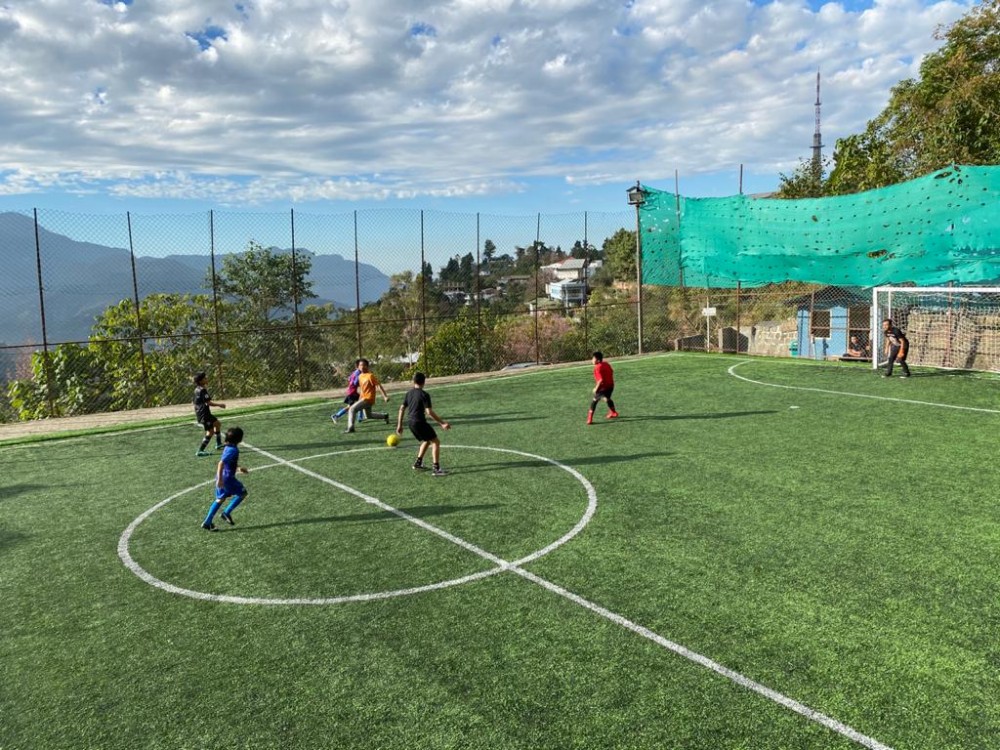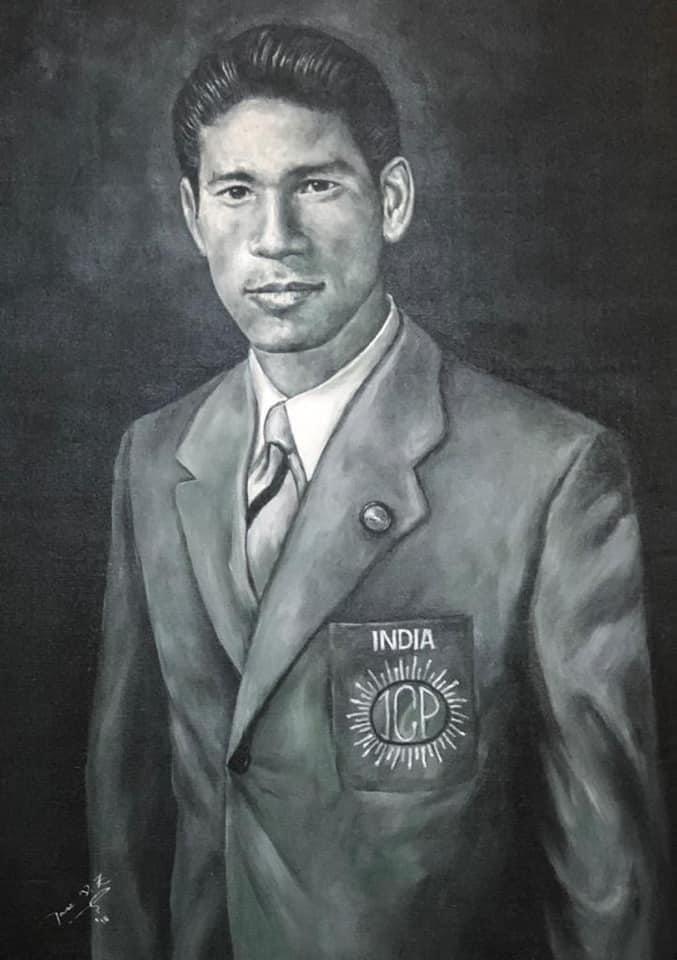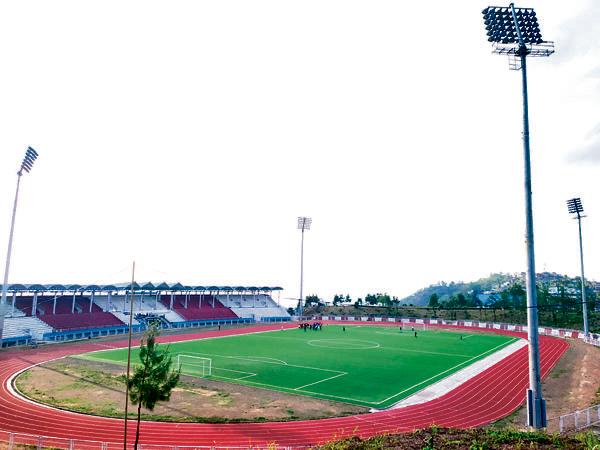Children playing Futsal in a private facility in Kohima, far away from their Olympic dreams.

Abu Metha
With Olympic fever, the conversation has obviously centered around sports. And the obvious question that is being posed is, why are we such a failure? It’s easy to play the blame game and point fingers, without looking at the causes and reasons. While it is an admitted fact that we have failed in the past decades, it is also a time to not dwell too much on the past, but rather focus on trying to change the narrative.

The legendary Dr. Talimeren Ao. How much longer will Nagas rely on his legacy when it comes to sports?
We are part of a nation that is amongst the least successful sporting countries on the planet. The worlds second most populous nation has the worst Olympic record in terms of medals per head. In the past three decades, prior to Tokyo 2020, India has won only one gold medal-in Men’s 10 Rifle in 2008. In 2012, at the London Olympics, with six medals, India averaged one medal for every 200 million people. In 2008, we got three medals. Why is this so? International experts believe that the main reason is money and lack of priority. Central and State Governments do not give priority to sports. The reality of the day is that when we cannot provide a few lakhs for a tournament or a coaching camp, how can we become a successful sporting nation.
India masters in making multi-millionaires of its medallists and champions, turning them into overnight heroes and superstars. A nation that is starved of sporting glory, except for the non-Olympic sport of Cricket, just can’t get enough of its handful of medallists. Pictures of politicians dominating congratulatory messages are the norm rather than the exception. Instead of focussing our resources on producing champions, the race for rewarding winners with cash, incentives and jobs becomes a frenzied race. While winners deserve every bit of the rewards and incentives, we are losing the plot if we do not focus our resources on grooming and developing talent.
Sports and games is no longer what it was even a decade ago. Today, sports is a multi-billion dollar industry that employs hundreds of thousands of people within and outside the sports arenas. It is no longer an activity that is considered a hobby, or for the purpose of physical fitness and healthy lifestyle. In fact, sports offer gainful prospects and high incomes in hundreds of careers, within the sports industry. For example, in the game of football, apart from being a footballer, there are dozens of career options like coaching in various departments of the game including physical training and conditioning, physiotherapist, sports psychologist, video analyst, statistician, scorer, officiating, sports management, broadcasting, data analyst, etc. It’s the same across all other sports disciplines. Moreover, unlike the past, sportspersons are already havingsuccessful careers due to the mushrooming of so many leagues and competitions, within the country and abroad, without even making it to national teams. Even a sport like kabaddi is giving opportunities to hundreds of sportspersons and creating thousands of employment opportunities through a super league. India is home to dozens of leagues across multiple sports disciplines, in a sports industry that runs into thousands of crores.
All these indicate to the point that we cannot afford to let our youth miss this bus. The fact that our girls and boys have the talent and capability is without doubt. But, in the field of sports, there are no short cuts to success. Performances cannot be manipulated and development of talent cannot be guided by favouritism and nepotism. There is only one way and it is through the roadmap of meritocracy, which must be applied in every aspect of the overall sports development plan; from game development andtalent hunting to building up of infrastructure.
Talent, capability and good luck do not bring medals and recognition on their own. Podium finishes, medal winning performances and the joy of victory can only happen if a stateand the system as a whole make investments and sacrifices that have long-term aims with clear-cut strategiesled by policy makers and policy implementors. It is pointless to look back at the past and regret the mistakes of history. Rather, we need to change the narrative from now onwards, if we are to have champion sportspersons, from Nagaland, 10 years from today.
It does not need rocket science to make world and Olympic champions. We need to invest our resources in building state-of-the-art infrastructure that is present and future ready. The little sports infrastructure that we have are either outdated or out of tune. They need to be decommissioned or upgraded, otherwise these liabilities are contributing towards producing sub-standard sportspersons who are unable to compete even at the regional level, leave alone the national competitions.

The outdated white elephant, Indira Gandhi Stadium in Kohima. The only multipurpose stadium in Nagaland was converted into a Football stadium after installation of astro turf. This has been detrimental to other sports disciples, especially athletics.
We need to develop an eco-system that produces champions in the long run. As far as infrastructure is concerned, we need to create sports academies and Centres of Sporting Excellence for selected and focussed sports disciplines. Centres of Excellence must feed sportspersons who attain higher standards into High Performance Centres that will groom them for international success. These must be backed-up with a strong support system that is powered by sports science where physical development and conditioning, diet and nutrition, mental and psychological strengthening, etc. play key roles.
Talent spotting cannot happen in one day jamborees. It needs to be identified and groomed through baby and junior leagues. Inter-school, club and collegiate events.Schools, colleges, clubs and local leagues must form the foundation for the development of a sporting society that starts creating a sports culture. All major disciplines must have its own leagues from the grassroots up. Furthermore, it is paramount that we develop the highest standards of human resources who are updated with the latest trends of sports science. Coaches, trainers, nutritionists, sports scientists, sports engineers, sports psychologists, management experts, etc are the groomers and moulders of raw talent.
Another important aspect is that, our society as a whole, must understand and appreciate the dynamics of sports. The education system must include sports in its core curriculum - from schools till the university level. The system of rewards, recognitions, scholarships and job security must be introduced if children are to be inspired and parents are to encourage their children towards pursuit of sports. This will ensure a change in mindset of parents and teachers.
Nagaland needs to pull up its socks in every aspect, if our youngsters are to even have a semblance of a chance to excel. The sports bodies and associations need to revamp and follow best practices, and that is possible only if they receive funding and support. Professionalism must be introduced at every level and performance should be the bottom-line for everybody-from the administrator, to the player on the ground.
Everywhere in the world, it is the local government which leads the way. The policy makers and the political leadership must have the will and the desire to place funds and resources towards sports development. Sports policies and motivational speeches mean nothing if we are unable to place an appreciable percentage of the State Budget towards sports development-both infrastructure and game. The political and bureaucratic appetite must be set aside to usher in meritocracy and fairness, from top down. History teaches us that with everything, a change and upheaval of the system cannot happen bottom up.
We are bound to do well in contact sports and disciplines that require high levels of hand-eye coordination. Contact sports like boxing, taekwondo and wrestling are conducted in weight categories, so our physique will in-fact become an advantage. Racket events like tennis, badminton, table tennis, squash and disciplines like fencing, hockey and cricket need exceptional hand-eye coordination. Athletics is not only the blue-ribbon of the Olympics but the foundation of all other sports, as running, jumping and throwing are requirements in almost every sporting activity. Football, volleyball, handball, shooting, archery and the new urban sports are all areas of potential where we can definitely compete with the best.
The education policy must introduce educational quotas and scholarships for courses in sports science, sports engineering, physical education, nutritionists, sports management, administration specialists and coaches. The education system must include rewarding excellence in sports, introduction of sports scholarships, job reservations for sportspersons and practice of pure merit in recruitment.
It all seems like too much of a task. But even other states that are as challenged as ours, if not worse off with resources, are doing much better than us. We have wasted too many years with promises. It’s now time to act. Or else, five years later and a decade down the line, we will be no better, perhaps much worse.
It’s time to look towards the future with concrete action instead of talking only about Dr Talimeren Ao and Chekrovlu Swuro as rare inspirations in an otherwise gloomy scenario, every time an Olympic games comes around. Medals and podium finishes do not happen by chance. A nation, a state and a society have to deserve that podium finish. While the hard work of a sportsperson and her or his team are the main reasons for success, it is very much true that success of an individual or a team is also due to her or his country and state deserving it for its efforts of investments and developments.
Naga society needs lifting, and nothing lifts the mood of a people more than sporting excellence and achievement.
(The writer is a former national level sportsperson and the Associate Vice President of the Athletic Federation of India.)





